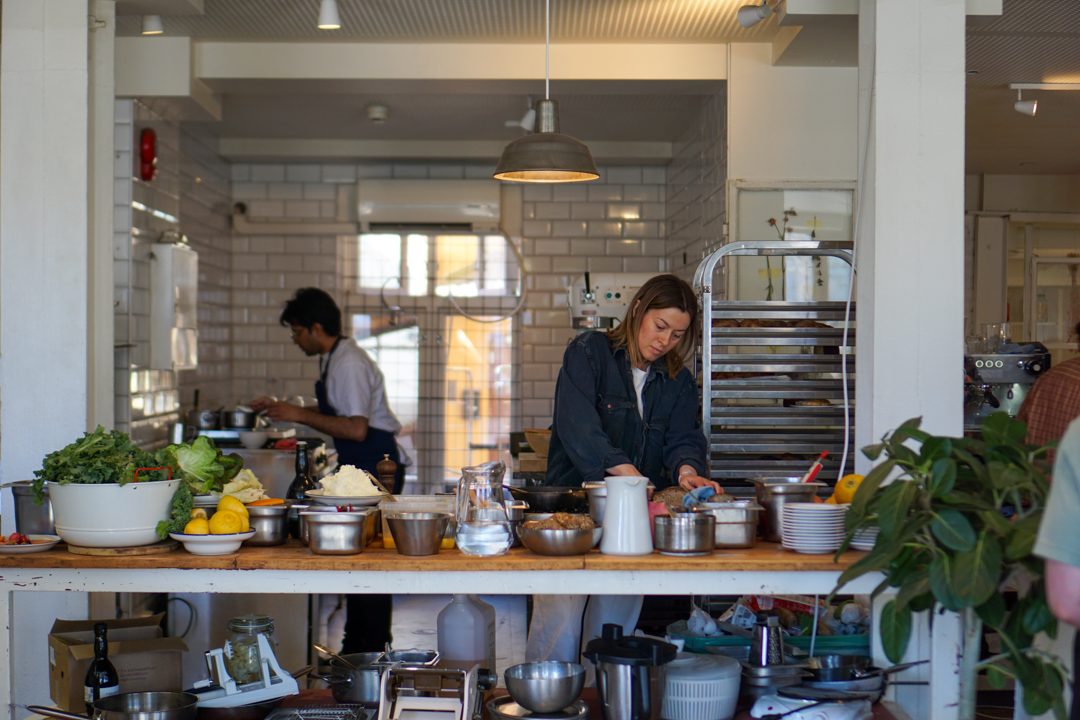
Babbo Collective Olaf Ryes, the latest addition to the growing chain, made its debut today. Originally envisioned as Pasta Baby, a standalone Italian bistro, the newly opened café-restaurant has been folded into the Babbo Collective identity. “For the moment, I just want to focus on the Babbo Collective brand. The essence remains the same: we’ll still be making hand-rolled pasta here,” co-founder Lennart Pedersen told us.
Lennart Pedersen works in the kitchen.
The menu. The shop looks right into Olaf Ryes plass.



For a brand as ubiquitous as Babbo Collective, it’s almost startling to remember that its first shop only opened in 2022. Yet in just three years, it has expanded into a chain of four cafés, two restaurants, and one roastery. Some of these venues operate as cafés during the day and restaurants in the evening; others shift concept entirely, making them difficult to categorise. In fact, this spontaneous, impulsive, and unpredictable business style has become Babbo Collective’s defining characteristic.
The trio behind the Babbo phenomenon are as international as their vision: Danish Lennart Pedersen, British Karen White, and Swedish Alexandra Karin Ek. They met while working in Copenhagen around 2017——Ek as the chef, White the baker, and Pedersen, in his own words, “working on everything.” When Danish hotel chain Guldsmeden approached them to run the hotel restaurants in Oslo and Berlin, they seized the opportunity and never looked back.
The hotel collaboration proved short-lived. “It is never fun to have someone making decisions over you. We humans need freedom…it didn’t work in the hotel,” Lennart Pedersen said in a 2023 interview with Avisa Oslo. “So we terminated the contract, gave them a high-five, and wondered what’s next,” he added. The answer was Babbo Collective Parkeveien—their first café/restaurant—just steps away from the hotel, alongside a production hub in Northern Oslo’s Frysja district.
Babbo Collective Parkeveien.


Pedersen has certainly maxed out every ounce of the freedom that was newly bestowed upon him. Within years, Babbo Collective sprawled across Oslo: in 2023, they took over Grünerløkka’s former Liebling café, then launched Restaurant Bente in Torshov, Restaurant Alex in Frogner, and Bakery Begeist in Frysja. With so much happening at once, Pedersen was working at least 15 hours a day, juggling all the locations. His solution? To get featured in a shoe commercial.
The rapid expansion might appear hasty, but was in fact partly justified by Babbo Collective’s soaring popularity. Their shops remain some of Oslo’s busiest throughout the day. One reason is the price. A cardamom bun, for example, might cost 50 to 55 NOK at many specialty cafés and artisan bakeries in Oslo, while at Babbo Collective the price remains around 36 NOK. “To keep the prices down, we need queues,” Alexandra Karin Ek told bakeri.net in a recent interview.
Babbo Collective Øvrefoss.


While many artisan bakeries in the city stress the quality of ingredients and supreme craftsmanship, Babbo Collective is one of the few that openly talk about the economy of scale. “In Oslo, you often pay a lot for very little. Many believe they have to raise prices during tough times. We do the opposite because that brings in more people. Low prices and high volume are our thing,” Karen White said in the same interview. “We come from working-class families ourselves, and we care about making sure people from all walks of life can afford to go out and eat good food. In our restaurants, we’ve gained many regular customers who come at least once or twice every week,” she added.
Pedersen has also been vocal about Oslo’s lack of a casual dining-out culture. By keeping prices low at Babbo Collective’s restaurants, “people could impulsively choose to eat out on any day for 200 to 300 NOK. This is common in Copenhagen, but still very rare in Oslo,” he told us.
Yet for all its scale, Babbo Collective pivots their concepts swiftly. Four months into 2025, Bib Roastery emerged from what was previously an office and storage space. Frida Bakery, originally set to open in August 2024, instead opened its doors in March 2025. Restaurant Alex was abruptly rebranded almost overnight as Babbo Collective Frogner, while Restaurant Bente transformed into a pop-up venue. Keeping up with all these fast-paced changes, spread across Babbo’s multiple Instagram accounts, can be dizzying.
Flat white made with beans roasted by Bib Roastery.

“We do not like making plans…and planning long ahead will just ruin the fun,” Alexandra Ek told us at the opening of Bib Roastery. But beneath the spontaneity lies a clear distribution of responsibilities: Frida supplies bread and pastries to all locations; Bib roasts their own coffee. The founders also divide roles cleanly: Ek oversees kitchens, White the bakeries, and Pedersen manages almost everything, including furniture-building and interior design.
This explains Babbo’s consistent aesthetic: white walls, wooden tables, and mustard-yellow accents. Look closely, and you might notice some unfinished details. Yet this intentional roughness creates an atmosphere of unpretentious comfort. The space has, in a way, become a reflection of its creators: open and bright, a little rough and edgy—sometimes loud, messy, and grumpy, yet always vivid and alive, crackling with an untameable energy.
